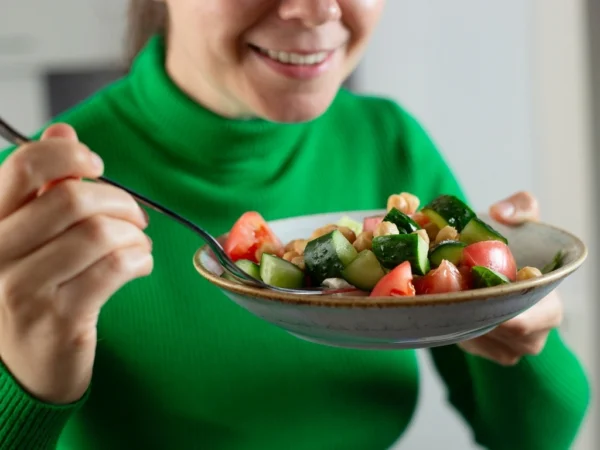Does polycystic ovary syndrome (PCOS) make you hungry all the time? Many people living with PCOS report experiencing intense cravings or finding it difficult to feel full after eating. These are signs that your hormones are seizing control, but it is possible to work toward taking it back.
Learn more about how PCOS and hunger are connected and the different strategies that can help you feel more in tune with your body.

Signs your hunger might be related to PCOS
How can you differentiate typical hunger from something more? If you have PCOS, your hunger may show up differently.
A 2024 study exploring the link between PCOS and hunger found that 33% of women diagnosed with PCOS had abnormal eating patterns, and 6% likely met the criteria for clinical binge-eating disorder.
Certain patterns can tell you whether your appetite is being driven by PCOS rather than just a need for calories:
- You rarely feel satisfied after eating and often get hungry again shortly after, even if you’ve just had a balanced meal.
- You experience strong, frequent cravings for carbohydrates or sugar intensely, and these urges feel hard to resist.
- You notice emotional triggers for eating, such as turning to food for comfort, which can lead to binge episodes.
- You find it hard to recognize when you’re full, so you tend to eat past the point of comfort without realizing it.
If several of these sound familiar, understanding why PCOS always makes you hungry is a good first step toward taking back control and improving your relationship with food.

Why does PCOS always make you hungry?
The link between PCOS and hunger comes down to hormone function. PCOS can make hunger feel unusually strong and persistent, all while making fullness harder to achieve. This is largely because the condition itself disrupts the hormones that control appetite and satiety:
Insulin
Insulin’s main job is to keep blood sugar stable. With PCOS, your cells don’t respond to insulin as they should. Insulin resistance can cause your blood sugar to swing between extreme highs and lows, driving hunger and powerful cravings. Your body ends up demanding more food, even when it doesn’t truly need it.
Leptin
Leptin is what sounds the alarm when you’re already full from eating. With PCOS, leptin levels are often high, but the brain becomes less sensitive to its signal. This is known as leptin resistance. Even when you have enough leptin in your system, what your body registers is that it’s still hungry, and so it’ll behave accordingly.
Cholecystokinin (CCK)
Your body releases cholecystokinin (CCK) after meals to help you feel full. With PCOS, this release may be lower, especially when you have higher testosterone levels. This leaves you with weaker fullness signals that can cause hunger to return quickly, even after heavy meals.
Managing hunger is essential when you have PCOS, as leaving it unchecked may lead to overeating, weight gain, and a higher risk of obesity and serious complications like stroke.
Are people with PCOS more likely to have an eating disorder?
Yes! Overall, research shows higher odds of disordered eating, including binge eating and bulimia, among people with PCOS. That doesn’t mean everyone with PCOS will have an eating disorder, but it does mean being attentive to patterns of loss control around food is important, so you can get help early.
4 simple ways to manage hunger with PCOS
If you want to break the cycle of PCOS and hunger, you must work with your body, not fight against it. Building consistent, achievable habits designed to restore hormonal balance is a solid place to start.
1. Limit your intake of refined carbs and added sugars
Refined carbs like white bread, white rice, or pasta, as well as foods with added sugars such as sweetened fruit drinks, sodas, desserts, and pastries, can both take a heavy toll on your body. When consumed in excess, they are likely to cause rapid blood sugar spikes and dips that trigger cravings.
Instead, opt for complex carbs such as oats, brown rice, or quinoa, and lower your added sugar intake.
2. Exercise regularly
Working out makes it easier to manage PCOS-driven hunger by improving insulin sensitivity and regulating your hormones. You don’t need high-intensity workouts to achieve this effect because it’s more about sustainable movement habits. Something as simple as daily walks can help you achieve better appetite control, as long as they’re done consistently.
3. Prioritize quality sleep
Poor sleep can mess with your hormones, particularly your ghrelin (the hunger hormone) and leptin. The result is an increased appetite and dulled “fullness” signals, and this combination can leave you craving high-carb, high-sugar foods.
Aim for seven to nine hours of sleep each night. To help you get better quality of sleep, avoid using your phone and other devices at least 30 minutes before bedtime.
4. Manage your stress effectively
Chronic stress raises cortisol levels, which can make you crave more high-sugar and high-fat foods. Integrating activities like meditation, journaling, or taking regular short breaks into your daily routine not only helps you stress less but also keeps your hormones and hunger in check.

Here’s how working with a Health Loft dietitian can help
Managing both your PCOS and hunger requires some hard work, but ultimately, remember that this process is highly individual. What works for someone else may not always work for you, and that’s completely okay.
Our registered dietitians understand the need for personalized solutions when it comes to PCOS. With one-on-one telehealth sessions, you can access evidence-based care that aligns with your lifestyle and body’s needs, no matter your location. Most services are covered by insurance, so you may pay as little as $0 out-of-pocket.
Feel more balanced and in control by working with a Health Loft dietitian. Discover how we can support you in your PCOS journey.
This article was reviewed by Adrienne DePaul, MS, RDN. It’s for informational purposes and doesn’t replace individualized medical advice. If you’re concerned about symptoms or treatment options, please speak with your health care provider.













